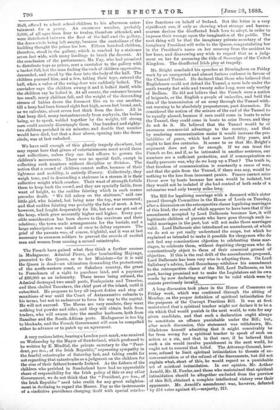Mr. Bright concluded his speeches at Birmingham on Friday week
by an unexpected and almost furious outburst in favour of the Channel Tunnel. He declared that those who believed that Englishmen could not defend the Tunnel, a mere hole under the- earth twenty feet wide and twenty miles long, were only worthy of Bedlam. He did not believe that the French were a nation of brigands, or the English a people of imbeciles, and held the- idea of the transmission of an army through the Tunnel with- out warning to be absolutely preposterous, past discussion. Re- considered the notion of the seizure of the end of the Tunnel to- be equally absurd, because if men could come in boats to seize the Tunnel, they could come in boats to seize Dover, and they do not do it. He believed that the Tunnel would be of enormous commercial advantage to the country, and that by rendering communication easier it would increase the pro- babilities of peace, which had now lasted fifty years, and ought to last five centuries. It seems to us that Mr. Bright's argument does not go far enough. If we can trust the French so far, and if, as he intimated in another sentence, our numbers are a sufficient protection, and if communication finally prevents war, why do we keep up a Fleet P The truth is, that freedom of communication is constantly a cause of war,. and that the gain from the Tunnel, if there was any, would be nothing to the loss from incessant panics. France cannot seize. Dover now by boats because her men would be isolated, but they would not be isolated if she had control of both ends of a submarine road only twenty miles long.


































 Previous page
Previous page